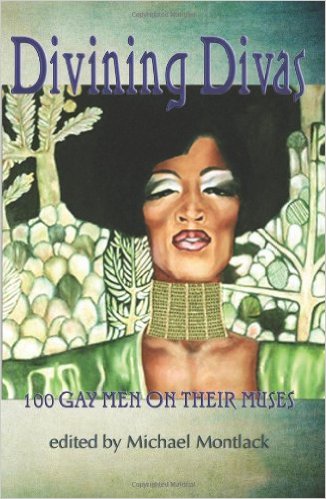Slow Lightning
by Eduardo C. Corral
Yale University Press. 96 pages, $18
Divining Divas: 100 Gay Men on their Muses
Edited by Michael Montlack
Lethe Press. 202 pages, $25
When We Become Weavers: Queer Female
Poets on the Midwestern Experience
Edited by Kate Lynn Hibbard
Squares & Rebels. 100 pages, $14.95
Among the Leaves: Queer Male
Poets on the Midwestern Experience
Edited by Raymond Luczak
Squares & Rebels. 126 pages, $14.95
Lady Business: A Celebration of Lesbian Poetry
Edited by Bryan Borland.
Sibling Rivalry Press. 146 pages, $16.95
Skin Shift
by Matthew Hittinger
Sibling Rivalry Press. 114 pages, $17.99
Butcher’s Sugar
by Brad Richard
Sibling Rivalry Press. 72 pages, $14.95
Later Poems Selected and New: 1971-2012
by Adrienne Rich
Norton. 608 pages, $39.95
NOW THAT 2012 is squarely in the past, it is clear this past year was a good one for lovers of poetry by gay men and lesbians.
One of the poets who made the perhaps biggest splash of 2012 was Eduardo C. Corral, whose Slow Lightning won the Yale Younger Poets Series, one of the highest honors for writers in this category. He is the first Latino to win the prize. Slow Lightning includes heart-wrenching poems about the immigrant experience, erotically charged but imagistically haunting lyrics of same-sex desire, and a set a powerful poems that draw on and honor acclaimed African-American poet Robert Hayden, who secretly struggled with homosexual feelings despite being married. (Another gay Latino poet, Richard Blanco, started 2013 out with a splash when he was chosen to be President Obama’s inaugural poet.)
For one press specializing in gay male poetry, 2012 was in fact a breakthrough year. It was also a year in which four separate anthologies were released, two from men and two from women.
Divining Divas: 100 Gay Men on their Muses, edited by Michael Montlack, is a who’s who of gay poets. The lively and diverse collection includes poet-muse pairings like Frank Bidart on Marilyn Monroe, Rafael Campo on Divine, and D.A. Powell on Donna Summer.
The sometimes dusty Midwestern ethos gets painted anew by queer poets in two anthologies that came out in 2012. When We Become Weavers: Queer Female Poets on the Midwestern Experience is edited by Kate Lynn Hibbard. Among the Leaves: Queer Male Poets on the Midwestern Experience is edited by Raymond Luczak. Both anthologies include well-known poets (James Cihlar, William Reichard, Sheila Packa) as well as new poets.
Lady Business: A Celebration of Lesbian Poetry, edited by Bryan Borland, is the first exclusively lesbian anthology from Sibling Rivalry Press, which began as a press focusing on gay male poets. The anthology includes well-known writers like Sally Bellerose and Maureen Seaton, and emerging stars like poet-editor Julie R. Enszer.
If anyone had a good 2012, it was, in fact, Sibling Rivalry Press (SRP). The press not only hit its stride (publishing numerous titles, debuting a new journal of queer male fiction entitled Jonathan), but it scored two industry accolades. First, their flagship gay poetry journal, Assaracus, was named one of Library Journal’s “best new magazines.” The journal explained, “[Assaracus] is publishing well-wrought, challenging literature that provides deep insight into the broad range of emotional experiences of being gay.”
Next, Matthew Hittinger, a SRP poet, was named one of Poet & Writer’s debut poets for 2012, a much-coveted honor for emerging poets. Talking about his book Skin Shift, Hittinger tells the magazine, “I’m a sucker for a good origin story, especially proto-queer origin stories, and part of the book’s aim is reclamation: queering myth out of a desire to make sure the long-hidden or ‘exists only in subtexts’ histories of gay and lesbians are preserved and brought to light.”
Skin Shift’s abiding metaphor is transformations, specifically myths of metamorphosis. The book’s heart may lie in a series of poems about Narcissus that cleverly (and at times sexily) combine mythology with modern gay life (e.g., cybersex). In the opening poem, the speaker remembers a boyhood love for Wonder Woman, whom he identifies as a figure of power but also of transformation (Diana Prince spinning herself into the superhero). The memory is also a space for realization of what happens when we are empowered by “leaning” into “the other side” of the imagination and “learning” to be oneself: “this leaning/ toward became learning toward, and I would sit/ visible to all as I piloted/ an invisible jet through the orange sky.”
Another title published in 2012 by SRP was Butcher’s Sugar, the third collection from award-winning poet Brad Richard. These poems masterfully render desire and anxiety, childhood fears and adult longing. Surprisingly, their raw material includes Greek myth, childhood monsters, and contemporary serial killers. In “Elegy in a Men’s Room,” the space of cruising becomes a place of lamentation: “No mystery,/ no key of flesh, no body to unlock:/ we swallowed it all. We are what we haunt.” Several of the more powerful poems look deep into the psyche of the middle-aged gay man, but often at a slant. In “Ganymede: Later,” an aging cup-bearer jealously warns the beautiful young men, “you’ll learn the lust/ that drags your beauty down, that bloats you as you drown.”
Even from the year’s saddest moments, however, came something of value. One of the most celebrated poets of the 20th century died last year, but Adrienne Rich left a 500-page volume, her Later Poems Selected and New, which is a testament to the poet who never stopped writing her fiery and poignant poems.






